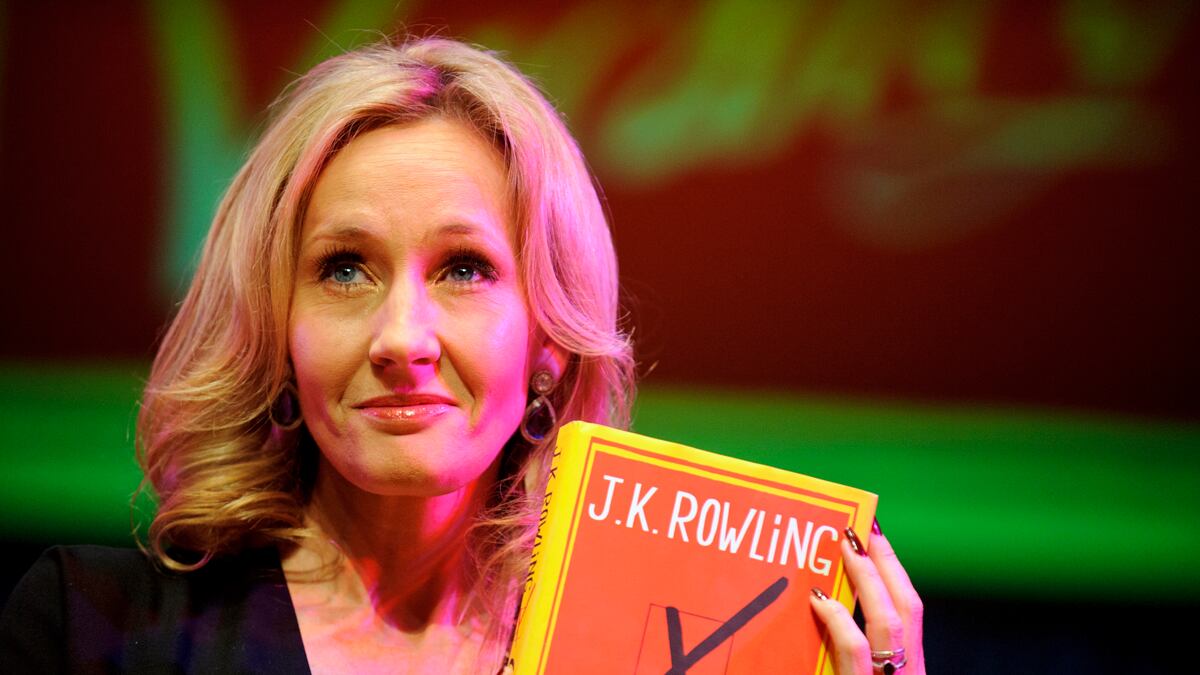Initial reactions to J.K. Rowling’s first adult novel, The Casual Vacancy, a bleak and depressing portrait of contemporary rural British society, featuring graphic sex, violence, and drug use, and peppered with foul language, focused on its unsuitability for younger readers. But, after Erica Wagner in the right-leaning Times compared Rowling’s concern for “a world in which the poor are left to fend for themselves” to Dickens’s social conscience, while Jan Moir, in the staunchly conservative Daily Mail, attacked the book as “relentless socialist manifesto masquerading as literature crammed down your throat,” the question of whether Rowling really was the guardian of our children’s innocence became a moot point. Accusations of her “snobbishness” toward the middle classes have taken center stage instead.
Rowling never denied that the novel is about class. “We’re a phenomenally snobby society,” she told Decca Aitkenhead, in the left-leaning Guardian, “and it’s such a rich seam.” Growing up in the Gloucestershire village of Tutshill (the real-life model for The Casual Vacancy’s town of Pagford), Rowling’s lower-middle-class upbringing gave way to life as a single-mother, “being as poor as you can be without being homeless,” she recalled on BBC’s Front Row, before the success of the Harry Potter novels propelled her onto the world’s rich lists. The (slightly embellished) story of the single-mother living off state benefits writing in coffee shops because she couldn’t afford to heat her flat, served the nation’s favorite children’s author well. Her subsequent millions proving less effective as a selling point for her adult novelist alter ego. “Why does JK Rowling hate the middle classes?” asked the Daily Mail, the same newspaper that described the nation’s onetime sweetheart as a “blinkered, Left-leaning demagogue quick to lambast what she perceives to be risible middle-class values while failing to see that her own lush thickets of dearly held emotions and prejudices are riddled with the same narrow-mindedness she is so quick to detect in others.” The conservative Telegraph also jumped on this more than a little ironic bandwagon, claiming that “like it or not she embraces, in work and in life, the conservative middle-class values she claims to despise.”
The fact that the book has provoked this distinct critical outpouring proves not simply just how class-conscious we British still are but also how complicated our relationship with our notion of the middle classes is. The upper classes are easier to deal with—we can nostalgically revere them (think of the success of The King’s Speech or Downton Abby) or revile them (constant criticism of an old Etonian-dominated government, recently highlighted in M.P. Andrew Mitchell’s derogatory use of the term “pleb”). The working classes too can be glorified or satirized (Martin Amis’s latest, Lionel Asbo is a case in point), but the middle classes are a different story, or, rather, not a story at all. While writers such as Jonathan Franzen and Jeffrey Eugenides have made their names investing the American middle classes with a tragic grandeur, there are few contemporary British counterparts.

When asked about the perils of satirizing the British middle classes, the writer Philip Hensher, whose last novel, King of the Badgers, was dark, funny, contemporary, and completely class-conscious, told me that “any novelist is going to be interested in the way people aspire to change themselves, worry about their position, are insecure about their surfaces and the way they fit into society or a larger whole.” Although he explained that he tries not to think “in terms of class structures” but “rather in terms of aspiring or despairing individuals,” he admitted that “these are all good classic descriptions of the middle class.” Not to mention the fact that most novelists hail from the middle classes themselves, “so it’s what they are interested in and know most about.” This is something that Rowling herself has admitted. “It’s the class I know best,” she told The Guardian. “I’ve laid my friends bare”—a comment that wouldn’t sound out of place spoken by Jessica Mitford, the scathing aristocratic social critic of the Mitford sisters’ fame and Rowling’s personal hero. The fact that most pundits also hail from the middle classes could, in part, suggest that some of the most vitriolic responses are just as much an indication of their own uncomfortable relationship to their class as Rowling’s.
It’s worth being reminded that Rowling pledged allegiance to her country, with all its flaws, by choosing to remain a domiciled taxpayer precisely because she is “indebted” to the British welfare state: “When my life hit rock bottom, that safety net, threadbare though it had become under John Major’s government, was there to break the fall.” It looks like she hasn’t forgotten her past, even if others have. A rare glowing review can be found in the Economist, praising Rowling’s novel as one of “insight and skill, deftly drawn.” “But,” they add, “her strengths as a story teller” won’t “stop the envious from carping,” neatly concluding that “writing has made Ms Rowling rich, and her riches have made her the subject of great envy.” Although undoubtedly true in some quarters, Hensher’s considered response to the novel, that it “isn’t so much an analysis of middle-class neurosis as a symptom of it,” presents a counterargument that firmly situates Rowling in the very strata of society critics say she’s trying to denigrate. To be fair, though, she doesn’t give any of her characters an easy ride, as Theo Tait points out in The Guardian: “All the characters are fairly horrible or suicidally miserable or dead.” Neither, as another critic observes, does she really make any of her characters that likable.
Although most reviewers have been distinctly underwhelmed, some praised the book’s finer qualities. Although acknowledging that it was “no masterpiece,” overall Tait surmised it as “intelligent, workmanlike, and often funny,” while Boyd Tonkin, in the left liberal Independent, admitted that, when on her home ground of portraying teenager protagonists, Rowling writes with “passion, verve, and even magic,” even if these adolescents are a far cry from Harry, Hermione, and Ron. “There is no part of me,” J.K. Rowling told the New Yorker’s Ian Parker, “that feels I represented myself as your children’s babysitter or their teacher.” Defending her decision to swap the magical world of Hogwarts for the realities of modern Britain, Rowling concluded, “I’m a writer and I will write what I want to write.” And she has, warts and all. Now it’s the turn of the critics.






